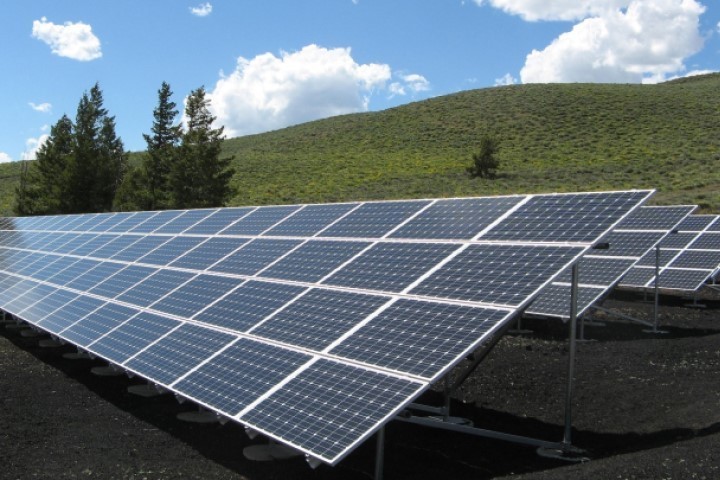Thailand’s two-decade long growth of the renewable energy sector has been pivotal in the pursuit of Thailand 4.0, but has the coronavirus outbreak thwarted these plans?
COVID-19 has forced many of the world’s most exciting economies into a full or partial shutdown, suspending their plans for development. Thailand is no exception.
The pandemic occurred just as Thailand was beginning to reap the rewards of an ambitious national strategy designed to shake off the ‘middle-income trap’ and propel the economy into high-income status, attracting more than THB 203.4 billion (USD 6 billion) of foreign investment into its target sectors between January and September 2019.
Renewable energy is one of these ten ‘S-Curve’ sectors and, like many infrastructure-centric industries, it is facing an uncertain short, medium and long-term future.
Pre-COVID-19 Trends in the Renewable Energy Sector in Thailand
Thailand’s national strategy to become a high-income, value-based economy runs parallel to and intertwines with its carbon reduction targets. In 2019, the Thai government and the National Energy Policy Council approved the Power Development Plan (PDP 2018-2037) after several years of revision.
The PDP 2018 – 2037 explicitly expresses that Thailand aims to become a low carbon country, with renewables accounting for 30% of the energy mix by 2037. Achieving this will require 56,431 MW of new power generation capacity—a significant opportunity for investors.
To implement the PDP 2018 – 2037, the Electricity Generating Authority of Thailand (EGAT) is executing several projects including a pilot project to develop and install the world’s largest hydro- floating solar hybrid power project, which combines hydropower and solar power project with an output of 45 MW at the Sirindhorn dam in Ubon Ratchathani, Thailand. EGAT aims and is committed to the development of floating solar farms at nine dams nationwide with a combined capacity of 2,725MW.
Although natural fuel will still represent the majority Thailand’s power production, dwindling domestic natural gas reserves will likely lead Thailand’s market to reconsider investment in more renewable energy projects in the future.
To support its carbon reduction and economic development plans, Thailand’s Board of Investment (the “BOI”) has introduced a number of tax incentives for investment in both renewable power generation and the manufacture of parts or equipment for solar power. These incentives include, but are not limited to tax holidays and exemptions on selected import duties (Refer to Appendix 1).
Caution and Delays
Investors in any industry rely on certainty and forward projections when making decisions. Unfortunately, there is still no definite end in sight for the COVID-19 pandemic, putting future projects in a difficult position.
Players in the renewables sector are understandably exercising caution. The pandemic has significantly reduced and disrupted cash flow and limited access to manpower. For projects already underway, contractors have a legal obligation to complete works, and these are set to resume as soon as it is deemed safe to do so.
In addition, government funding is being saved or diverted to maintain cash flow and support projects directly related to the pandemic, such as the healthcare industry and businesses that may be struggling with reduced consumer spending.
Renewables Opportunities for Thailand
Despite the short and medium-term interruption to investment in the renewables sector, the outcome and effects of COVID-19 could provide some interesting opportunities going forward, thanks to certain factors below:
- Supply of Renewables Materials
Currently, many renewable energy projects worldwide rely on the supply of material, components and equipment from China, South Korea and Vietnam. Due to supply chain disruption in these countries, the renewables sector will have to seek alternative sources of supply. This creates room in a tight market for investors in Thailand to become domestic suppliers who can offer more competitive prices due to lower logistics costs and possibly more a more reliable supply chain, as long as the manufacturing industry can keep up.
- Higher Profit Margins
Once the pandemic finally comes to an end—or at least subsides to the extent that progress on renewables projects can resume—many governments could apply a lower interest rate, making investments more profitable. This could lead to a boom in renewables investment in the immediate aftermath of COVID-19.
Globally, the unit cost for the installation of solar photovoltaic (PV) systems and onshore wind power has also declined significantly in recent years. According to the World Economic Forum, the global weighed average of installed cost for solar PV has dropped an impressive 73.8%, from USD 4621/kW in 2010 to USD 1210/kW in 2018.
COVID-19 is a Sign to Supercharge, Not Slow Down
For the time being, progress in the renewables sector is slow. Projects that are already underway will be completed as a priority when lockdown restrictions under the government’s emergency decree are lifted—this is currently being targeted for August 31, 2020.
When investor confidence returns to the market, it is likely that we will see a big push to move existing projects forward and finalise investment decisions that were delayed as a result of COVID-19. This could create an exciting market in Thailand for renewables.
However, at this stage, everything is speculation. The true impact of COVID-19 cannot yet be fully realised or measured. While we can be confident that things will eventually return to normal, investment inflows will pick up and projects will get completed, there is little certainty as to when this will be.
For further information, please contact the authors or our Projects and Energy Practice Group at Kudun and Partners.
Appendix 1
BOI Incentives for Players in the Renewable Energy Industry
- Electricity Production Business
| Type | Activity | Incentives |
| 7.1.1.2 | Production of electricity or steam from renewable energy, such as solar energy, wind energy, biomass or biogas, etc. except for garbage or refuse-derived fuel | A2 – Exemption on CIT for 8 years, not exceeding 100% of the investment amount (excluding land and working capital) – Exemption on import duty on machinery – Exemption on import duty on raw or essential materials used in manufacturing export products for 1 year (This may not apply if there is no export product.) – Non-tax incentives |
- Equipment Production Business
| Type | Activity | Incentives |
| 5.4.2 | Manufacture of solar cells and/or raw materials for solar cells | A2 – Exemption on CIT for 8 years, not exceeding 100% of the investment amount (excluding land and working capital) – Exemption on import duty on machinery – Exemption on import duty on raw or essential materials used in manufacturing export products for 1 year – Non-tax incentives |
| 5.4.8 | Manufacture of parts and/or equipment for solar-powered products | A3 – Exemption on CIT for 5 years, not exceeding 100% of the investment amount (excluding land and working capital) – Exemption on import duty on machinery – Exemption on import duty on raw or essential materials used in manufacturing export products for 1 year – Non-tax incentives |
- Business using renewable energy for its own consumption
Improvement of production efficiency by upgrading technology and machinery for energy conservation, alternative energy utilization, or reduction of environmental impacts may qualify for incentives according to Thailand’s Board of Investment Announcement No. 9/2560 (the “BOI Announcement”).
Criteria:
i) This applies to existing businesses only, be it BOI or non-BOI businesses. In the case of non-BOI businesses, the activity must be eligible for investment promotion by BOI at the time of application.
ii) BOI-promoted businesses can apply after the corporate income tax exemption or reduction period has expired, as well as businesses that have not received the corporate income tax exemption.
iii) The applicant must submit an investment plan for machinery replacement or upgrade to save energy, to introduce alternative energy into the business, or to reduce environmental impacts by implementing one of the following:
-
- Project must invest in upgrading machinery to modern technology that reduces energy consumption at the stipulated ratio according to the BOI Announcement;
- Project must invest in upgrading machinery to use alternative energy at the stipulated ratio to the total energy consumption according to the BOI Announcement; or
- Project must invest in upgrading machinery to reduce environmental impacts; namely, reducing waste, waste water or exhaust air according to the BOI Announcement.
iv) The application shall be submitted by December 30, 2020, and the project must be implemented within three years from the date the promotion certificate is issued.
v) Minimum capital investment:
-
- THB 1 million for each project (excluding the cost of land and working capital); or
- THB 500,000 (excluding the cost of land and working capital) for Small and Medium Enterprises (SMEs).
vi) SMEs project qualifications:
-
- Total net fixed assets or total investment (excluding land and working capital) must not exceed THB 200 million.
- Thai nationals must hold shares not less than 51% of the registered capital.
Tax incentives
-
- Exemption on CIT for 3 years, not exceeding 50% of the investment amount (excluding land and working capital).
- Exemption of import duty on machinery.
Download Article
About Us
Projects and Energy Practice Group
Kudun and Partners has a broad range of experience in all aspects of the energy industry including solar farms, solar rooftops, wind farms, Waste-to-energy (WtE) and natural gas powerplants. We leverage our unparalleled business and legal prowess assisting clients from inception to completion of a project, throughout the project’s operational lifecycle. Our services include providing advice on FDI regulations, incentives by the BOI, company incorporation, corporate structure, tax structuring, acquisition and joint venture agreements, bid preparation, contract negotiation, and project financing.
Our recent work includes representing B. Grimm Power and Energy China Consortium, successfully helping them win the bid to develop the first phase of the world’s largest hydro- floating solar hybrid power project at Sirindhorn dam by the Electricity Authority of Thailand (EGAT) worth over THB 842 million (approximately USD 27 million)
Authors:

Kudun Sukhumananda
Partner
kudun.s@kap.co.th
Chai Lertvittayachaikul
Senior Associate
chai.l@kap.co.th



